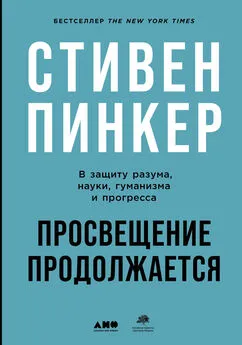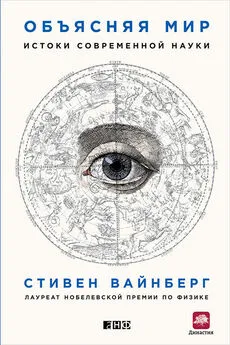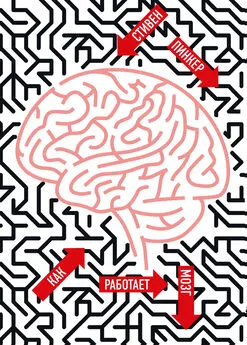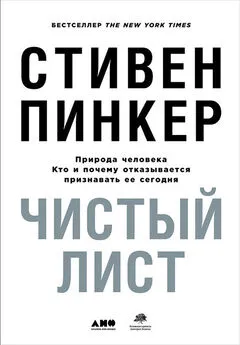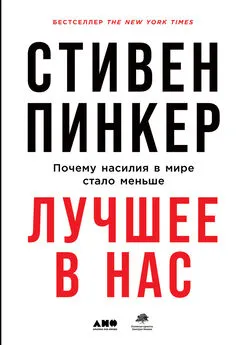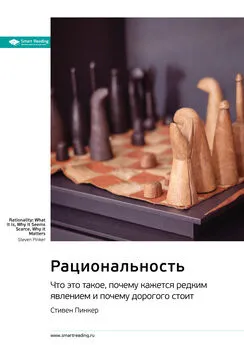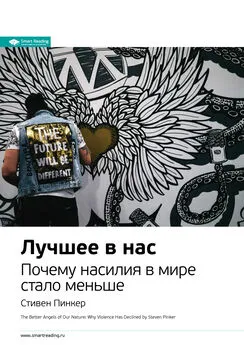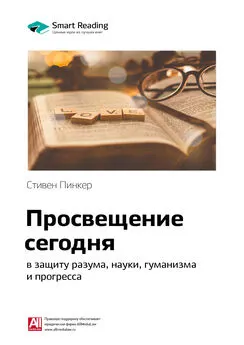Стивен Пинкер - Просвещение продолжается. В защиту разума, науки, гуманизма и прогресса
- Название:Просвещение продолжается. В защиту разума, науки, гуманизма и прогресса
- Автор:
- Жанр:
- Издательство:Альпина нон-фикшн
- Год:2021
- Город:Москва
- ISBN:9785001395362
- Рейтинг:
- Избранное:Добавить в избранное
-
Отзывы:
-
Ваша оценка:
Стивен Пинкер - Просвещение продолжается. В защиту разума, науки, гуманизма и прогресса краткое содержание
Этот прогресс – не случайность и не результат действия внешних сил. Это дар современному миру от деятелей Просвещения, которые первыми додумались, что знания можно использовать во имя процветания всего человечества. Идеи Просвещения – вовсе не наивные мечтания. Наоборот, они сработали – и это неоспоримый факт. Тем не менее именно сейчас эти идеи особенно нуждаются в нашей защите, поскольку противостоят характерным недостаткам человеческой природы – трайбализму, авторитаризму, демонизации чужаков и магическому мышлению, – которые так нравится эксплуатировать современным демагогам. Да, стоящие перед человечеством проблемы огромны, но все они решаемы, если мы, продолжая дело Просвещения, используем для этого разум, доверяем науке и руководствуемся идеалами гуманизма.
Особенности
Более 70 графиков из почти всех областей человеческой жизни.
Для кого
Для поклонников Стивена Пинкера. Для всех, кто интересуется природой человека. Для тех, кто верит в прогресс, и для тех, кто в нем сомневается.
Просвещение продолжается. В защиту разума, науки, гуманизма и прогресса - читать онлайн бесплатно ознакомительный отрывок
Интервал:
Закладка:
Twenge, J. M., & Nolen oeksema, S. 2002. Age, gender, race, socioeconomic status, and birth cohort differences on the children’s depression inventory: A meta nalysis. Journal of Abnormal Psychology, 111, 578–88.
Twenge, J. M., Sherman, R. A., & Lyubomirsky, S. 2016. More happiness for young people and less for mature adults: Time period differences in subjective well eing in the United States, 1972–2014. Social Psychological and Personality Science, 7, 131–41.
ul Haq, M. 1996. Reflections on human development . New York: Oxford University Press.
UNAIDS: Joint United Nations Program on HIV/AIDS. 2016. Fast rack: Ending the AIDS epidemic by 2030 . Geneva: UNAIDS.
Union of Concerned Scientists. 2015a. Close calls with nuclear weapons. http://www.ucsusa.org/sites/default/files/attach/2015/04/Close%20Calls%20with%20Nuclear%20Weapons.pdf.
Union of Concerned Scientists. 2015b. Leaders urge taking weapons off hair-trigger alert. http://www.ucsusa.org/nuclear-weapons/hair-trigger-alert/leaders#.WUXs6evysYN.
United Nations. 1948. Universal Declaration of Human Rights. http://www.un.org/en/universaldeclaration-human-rights/index.html.
United Nations. 2015a. The Millennium Development Goals Report 2015 . New York: United Nations. United Nations. 2015b. Millennium Development Goals, goal 3: Promote gender equality and empower women. http://www.un.org/millenniumgoals/gender.shtml.
United Nations Children’s Fund. 2014. Female genital mutilation/cutting: What might the future hold? New York: UNICEF.
United Nations Development Programme. 2003. Arab Human Development Report 2002: Creating opportunities for future generations . New York: Oxford University Press.
United Nations Development Programme. 2011. Human Development Report 2011 . New York: United Nations.
United Nations Development Programme. 2016. Human Development Index (HDI). http://hdr.undp.org/en/content/human-development-index-hdi.
United Nations Economic and Social Council. 2014. World crime trends and emerging issues and responses in the field of crime prevention and criminal justice. https://www.unodc.org/documents/data-and-analysis/statistics/crime/ECN.1520145_EN.pdf.
United Nations Food and Agriculture Organization. 2012. State of the world’s forests 2012 . Rome: FAO.
United Nations Food and Agriculture Organization. 2014. The state of food insecurity in the world . Rome: FAO.
United Nations Office for Disarmament Affairs. (Undated.) Treaty on the non roliferation of nuclear weapons (NPT). https://www.un.org/disarmament/wmd/nuclear/npt/text.
United Nations Office of the High Commissioner for Human Rights. 1966. International covenant on economic, social and cultural rights. http://www.ohchr.org/EN/ProfessionalInterest/Pages/CESCR.aspx. United Nations Office on Drugs and Crime. 2013. Global study on homicide. https://www.unodc.org/gsh/en/data.html.
United Nations Office on Drugs and Crime. 2014. Global study on homicide 2013 . Vienna: United Nations.
United States Census Bureau. 2016. Educational attainment in the United States, 2015. https://www.census.gov/content/dam/Census/library/publications/2016/demo/p20-578.pdf.
United States Census Bureau. 2017. Population and housing unit estimates. https://www.census.gov/programs-surveys/popest/data.html.
United States Department of Defense. 2016. Stockpile numbers, end of fiscal years 1962–2015. http://open.defense.gov/Portals/23/Documents/frddwg/2015_Tables_UNCLASS.pdf.
United States Department of Labor. 2016. Women in the labor force. https://www.dol.gov/wb/stats/facts_over_time.htm.
United States Environmental Protection Agency. 2016. Air quality – national summary. https://www.epa.gov/air-trends/air-quality-national-summary.
Unz, D., Schwab, F., & Winterhoff-Spurk, P. 2008. TV news – the daily horror? Emotional effects of violent television news. Journal of Media Psychology, 20, 141–55.
Uppsala Conflict Data Program. 2017. UCDP datasets. http://www.pcr.uu.se/research/ucdp/datasets/.
van Bavel, B., & Rijpma, A. 2016. How important were formalized charity and social spending before the rise of the welfare state? A long un analysis of selected Western European cases, 1400–1850. Economic History Review, 69, 159–87.
van Leeuwen, B., & van Leewen i, J. 2014. Education since 1820. In J. van Zanden, J. Baten, M. M. d’Ercole, A. Rijpma, C. Smith, & M. Timmer, eds., How was life? Global well eing since 1820 . Paris: OECD Publishing.
van Zanden, J., Baten, J., d’Ercole, M. M., Rijpma, A., Smith, C., & Timmer, M., eds. 2014. How was life? Global well eing since 1820 . Paris: OECD Publishing.
Värnik, P. 2012. Suicide in the world. International Journal of Environmental Research and Public Health, 9, 760–71.
Veenhoven, R. 2010. Life is getting better: Societal evolution and fit with human nature. Social Indicators Research 97, 105–22.
Veenhoven, R. (Undated.) World Database of Happiness. http://worlddatabaseofhappiness.eur.nl/.
Verhulst, B., Eaves, L., & Hatemi, P. K. 2015. Erratum to “Correlation not causation: The relationship between personality traits and political ideologies.” American Journal of Political Science, 60, E3–E4.
Voas, D., & Chaves, M. 2016. Is the United States a counterexample to the secularization thesis? American Journal of Sociology, 121, 1517–56.
Walther, B. A., & Ewald, P. W. 2004. Pathogen survival in the external environment and the evolution of virulence. Biological Review, 79, 849–69.
Watson, W. 2015. The inequality trap: Fighting capitalism instead of poverty . Toronto: University of Toronto Press.
Weaver, C. L. 1987. Support of the elderly before the Depression: Individual and collective arrangements. Cato Journal, 7, 503–25.
Welch, D. A., & Blight, J. G. 1987–88. The eleventh hour of the Cuban Missile Crisis: An introduction to the ExComm transcripts. International Security, 12, 5–29.
Welzel, C. 2013. Freedom rising: Human empowerment and the quest for emancipation . New York: Cambridge University Press.
Whaples, R. 2005. Child labor in the United States. In R. Whaples, ed., EH.net Encyclopedia . http://eh.net/encyclopedia/child-labor-in-the-united-states/.
White, M. 2011. Atrocities: The 100 deadliest episodes in human history . New York: Norton.
Whitman, D. 1998. The optimism gap: The I’m OK – They’re Not syndrome and the myth of American decline . New York: Bloomsbury USA.
Wieseltier, L. 2013. Crimes against humanities. New Republic, Sept. 3.
Wilkinson, R., & Pickett, K. 2009. The spirit level: Why more equal societies almost always do better . London: Allen Lane.
Wilkinson, W. 2016a. Revitalizing liberalism in the age of Brexit and Trump. Niskanen Center Blog . https://niskanencenter.org/blog/revitalizing-liberalism-age-brexit-trump/.
Wilkinson, W. 2016b. What if we can’t make government smaller? Niskanen Center Blog . https://niskanencenter.org/blog/cant-make-government-smaller/.
Williams, J. H., Haley, B., Kahrl, F., Moore, J., Jones, A. D., et al. 2014. Pathways to deep decarbonization in the United States (rev. ed.). San Francisco: Institute for Sustainable Development and International Relations.
Willingham, D. T. 2007. Critical thinking: Why is it so hard to teach? American Educator, Summer, 8–19.
Willnat, L., & Weaver, D. H. 2014. The American journalist in the digital age . Bloomington: Indiana University School of Journalism.
Wilson, E. O. 1998. Consilience: The unity of knowledge . New York: Knopf.
Wilson, M., & Daly, M. 1992. The man who mistook his wife for a chattel. In J. H. Barkow, L. Cosmides, & J. Tooby, eds., The adapted mind: Evolutionary psychology and the generation of culture . New York: Oxford University Press.
Wilson, W. 2007. The winning weapon? Rethinking nuclear weapons in light of Hiroshima. International Security, 31, 162–79.
WIN allup International. 2012. Global Index of Religiosity and Atheism. http://www.wingia.com/web/files/news/14/file/14.pdf.
Winship, S. 2013. Overstating the costs of inequality. National Affairs, Spring.
Wolf, M. 2007. Proust and the squid: The story and science of the reading brain. New York: HarperCollins.
Wolin, R. 2004. The seduction of unreason: The intellectual romance with fascism from Nietzsche to postmodernism . Princeton, NJ: Princeton University Press.
Wood, G. 2017. The way of strangers: Encounters with the Islamic State . New York: Random House.
Woodley, M. A., te Nijenhuis, J., & Murphy, R. 2013. Were the Victorians cleverer than us? The decline in general intelligence estimated from a meta nalysis of the slowing of simple reaction time. Intelligence, 41, 843–50.
Woodward, B., Shurkin, J., & Gordon, D. 2009. Scientists greater than Einstein: The biggest lifesavers of the twentieth century . New York: Quill Driver.
Woolf, A. F. 2017. The New START treaty: Central limits and key provisions . Washington: Congressional Research Service. https://fas.org/sgp/crs/nuke/R41219.pdf.
Wootton, D. 2015. The invention of science: A new history of the Scientific Revolution . New York: Harper-Collins.
World Bank. 2012a. Turn down the heat: Why a 4 ℃ warmer world must be avoided . Washington: World Bank.
World Bank. 2012b. World Development Report 2013: Jobs . Washington: World Bank.
World Bank. 2016a. Adult literacy rate, population 15+ years, both sexes (%). http://data.worldbank.org/indicator/SE.ADT.LITR.ZS.
World Bank. 2016b. Air transport, passengers carried. http://data.worldbank.org/indicator/IS.AIR.PSGR. World Bank. 2016c. GDP per capita growth (annual %). http://data.worldbank.org/indicator/NY.GDP.PCAP.KD.ZG.
World Bank. 2016d. Gini index (World Bank estimate). http://data.worldbank.org/indicator/SI.POV.GINI?locations=US.
World Bank. 2016e. International tourism, number of arrivals. http://data.worldbank.org/indicator/ST.INT.ARVL.
World Bank. 2016f. Literacy rate, youth (ages 15–24), gender parity index (GPI). http://data.worldbank.org/indicator/SE.ADT.1524.LT.FM.ZS.
World Bank. 2016g. PovcalNet: An online analysis tool for global poverty monitoring. http://iresearch.worldbank.org/PovcalNet/home.aspx.
World Bank. 2016h. Terrestrial protected areas (% of total land area). http://data.worldbank.org/indicator/ER.LND.PTLD.ZS.
World Bank. 2016i. Youth literacy rate, population 15–24 years, both sexes (%). http://data.worldbank.org/indicator/SE.ADT.1524.LT.ZS.
World Bank. 2017. World development indicators: Deforestation and biodiversity. http://wdi.worldbank.org/table/3.4.
World Health Organization. 2014. Injuries and violence: The facts 2014 . Geneva: World Health Organization. http://www.who.int/violenceinjury prevention/media/news/2015/Injury violence facts 2014/en/.
World Health Organization. 2015a. European Health for All database (HFA B). http://data.euro.who.int/hfadb/.
World Health Organization. 2015b. Global technical strategy for malaria, 2016–2030 . Geneva: World Health Organization. http://apps.who.int/iris/bitstream/10665/176712/1/9789241564991_eng.pdf?ua=1&ua=1.
World Health Organization. 2015c. Trends in maternal mortality, 1990 to 2015 . Geneva: World Health Organization. http://apps.who.int/iris/bitstream/10665/194254/1/9789241565141_eng.pdf?ua=1. World Health Organization. 2016a. Global Health Observatory (GHO) data. http://www.who.int/gho/mortality_burden_disease/life_tables/situation_trends/en/.
Читать дальшеИнтервал:
Закладка:
